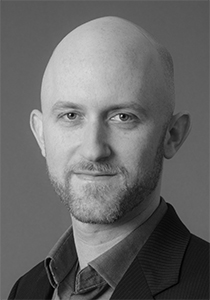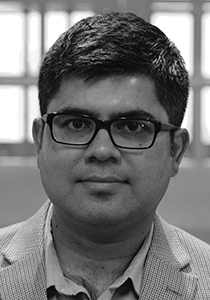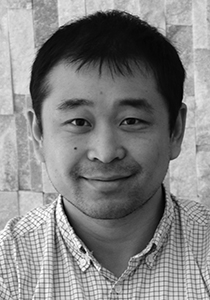Citation for George Ban-Weiss

George Ban-Weiss has an extremely impressive track record of carrying out research that has led to both fundamental science advances and policy-relevant research conclusions. He is best known for his outstanding contributions to modeling and measurement of land cover–climate–air pollution interactions from urban to global scales. His research has been influential and has had societal impact, and he has used innovative approaches to education and outreach.
Ban-Weiss is an expert on atmospheric aerosols and has used field measurements, satellite observations, and numerical modeling to improve our understanding of particle emissions, evolution in the atmosphere, and impacts on climate. His research has made important contributions to improving our understanding of climate science. One of my favorites is his paper “Dependence of climate forcing and response on the altitude of black carbon aerosols,” which has transformed the way scientists think about the climate effects of black carbon. His research on black carbon emissions has also informed public policies related to diesel truck retrofit standards that have contributed to saving lives and mitigating climate change.
Ban-Weiss has another very important line of research related to determining methods for reducing urban heat in the face of urban heat islands and global climate change. Beyond improving our understanding of urban climate science, he also has worked diligently with city governments including the Los Angeles mayor’s sustainability office to ensure that policies will meet their objectives while minimizing unintended consequences. I think his systems approach to finding solutions to environmental problems is especially important, not being afraid to investigate both benefits and penalties. He has unique expertise in climate, atmospheric chemistry, and land–atmosphere interactions and has worked across silos to create innovative research.
Ban-Weiss is highly deserving of this distinction. He is a very talented young scientist, and his passion for research and scientific discovery is infectious.
—Ken Caldeira, Carnegie Institution for Science, Stanford, Calif.
Response
Thank you so much, Ken, for nominating me and for these very kind words. I am honored to have received this award. I appreciate AGU and the Global Environmental Change focus group.
I have been extremely fortunate to have had incredible mentors who have helped guide my academic journey thus far. When I was an undergraduate, Tony Wexler piqued my interest in conducting research on air pollution. He has been a mentor to me since I was 20 years old. Bob Dibble was also an important mentor in my early years and helped solidify my decision to attend graduate school. Rob Harley was as good a Ph.D. advisor as one could ask for, teaching me the value of academic excellence and how rewarding (and fun!) research can be. Ken Caldeira took a big chance on me, hiring me as a postdoc in a field in which I had relatively little experience. He went above and beyond the call of duty and taught me how to think like a scientist and to have the courage to shoot for the stars. I also learned a huge amount at Lawrence Berkeley Lab, especially from Ronnen Levinson and Bill Collins. I am very appreciative of my colleagues at University of Southern California. The Department of Civil and Environmental Engineering has provided a very supportive and engaging environment for me, and I couldn’t think of a better place to build a career as an assistant professor. Last, this award certainly would not have been possible without the extremely hard work of current and past members of my research group: Trevor Krasowsky, Pouya Vahmani, Jiachen Zhang, Arash Mohegh, Yun Li, Mo Chen, Joseph Ko, Hannah Schlaerth, and Mohammad Taleghani. Thank you!
On a more personal level, I am deeply appreciative of the nonstop love and support of my family.
—George Ban-Weiss, University of Southern California, Los Angeles
Citation for Rajan Chakrabarty

Rajan Chakrabarty is bestowed with an AGU Global Environmental Change award in recognition of his substantive contributions to the award’s three interconnected dimensions of research, educational, and societal impacts. Rajan has a multifaceted research program in aerosol science and technology. His outstanding work on addressing global environmental challenges associated with radiative forcing by carbonaceous aerosols is a major accomplishment, yet it represents only a portion of his research portfolio, which also includes advances in fundamental aerosol physics and aerosol engineering techniques. Most relevant to this award, Rajan has conducted detailed experimental and modeling studies to understand and characterize the complex morphological and optical properties of atmospheric black carbon aerosols, which have challenged the scientific community for decades. He also discovered that large-scale wildfires emit a previously unrecognized form of soot particle—a superaggregate—which has unaccounted-for climatic and health implications. His work on coated (internally mixed with nonrefractory matter) black carbon and its role in enhancing light absorption in the atmosphere provided new insights on the universal scaling relationships for the mass absorption cross sections of these particles. Rajan has also comprehensively characterized the spectral refractive indices and intensive optical properties of light-absorbing organic aerosols emitted from various sources globally using state-of-the-art instrumentation; and he made the resulting data sets freely available to the modeling and satellite-retrieval communities for fine-tuning of their algorithms. In addition, his work is providing insights into the drivers of atmospheric and climate conditions over India where researchers and policy makers are using his work to advance the state of science and develop air quality management plans. Among his many contributions to education, Rajan developed Climate101.org, a portal to support in-class environmental science education for K–12 students and teachers.
It has been a pleasure to watch Rajan’s professional trajectory, which has already reached great heights and will continue to rise.
—Jay Turner, Washington University in St. Louis, St. Louis, Mo.
Response
Thank you, Jay, for your nomination and for such encouraging words. I’ve got to admit, our hallway conversations are not only refreshing and motivational but also addictive; I subconsciously look forward to them each week.
Being trained as a physicist, I have always taken a bottom-up approach overlaid on the foundations of first-order scientific principles to better understand and address the contemporary “environmental change” issues associated with the aerosol–energy–climate nexus. I thank AGU and the Global Environmental Change (GEC) focus group for taking special note of my research contributions and bestowing on me this honor.
Just as the saying goes, “it takes a village to raise a child,” a sheer number of people have contributed their comments, criticism, and support to raising the scientist in me over the years. The list is a long one, and I would run out of words and space to thank everyone. That being said, the immense sense of gratitude that I feel for a particular individual on this occasion makes it very difficult to leave out Hans Moosmuller, my doctoral advisor. He not only initiated me into the field of aerosols but also painstakingly taught me how to build instruments, make careful measurements, and do overall good science. He would pay equal attention to the development of my soft skills necessary to succeed in today’s collaborative scientific environment. In my professorial career, I have been fortunate enough to work with a brilliant set of graduate students and postdocs; this honor is as much theirs as mine.
Last but not least, I would like to thank my family for their unwavering support and love throughout these years. I would not be here today without the many sacrifices they have made for me to realize my scientific goals and aspirations.
—Rajan Chakrabarty, Washington University in St. Louis, St. Louis, Mo.
Citation for Kaiyu Guan

Dr. Kaiyu Guan is an exceptional early-career scientist who has shown remarkable creativity and maturity, tackling the grand challenge of feeding a growing population under climate change.
Dr. Guan started his training in geography and remote sensing at Nanjing University in China. During his Ph.D. studies at Princeton University, he gained advanced skills and knowledge in remote sensing, Earth system modeling, and high-performance computing. With these tools, he addressed key questions regarding how climate and land surface hydrological processes control vegetation distribution and productivity at the continental scale in Africa and the Amazon. His innovative use of massive satellite data and Earth system modeling revealed fundamental rules of how hydrological variability and cross-season groundwater storage determine tree cover fraction and control seasonal to interannual variability of photosynthesis rates in tropical forest ecosystems.
Kaiyu then took an unconventional path to apply his ecohydrology and computational skills to complex agricultural ecosystems as a postdoc at Stanford University. There he developed new algorithms to use novel satellite-based observations, such as solar-induced chlorophyll fluorescence, to monitor U.S. crop productivity from space. He also developed a new computational framework to model crop growth in the Earth system models and used it to better assess the climate change impacts on agriculture systems.
Here at the University of Illinois, Dr. Guan has established a truly world-class research program at the frontiers of ecohydrology, climate change, remote sensing, and crop modeling, from local to global scales. I am confident that his research in food security and environmental sustainability will lead to significant advancements in how we monitor and model agricultural systems across the globe under current and future climates. In conclusion, for the excellence of the work he has done and for the promise of much more to come, Dr. Guan fully deserves the GEC Early Career Award.
—Murugesu Sivapalan, University of Illinois at Urbana-Champaign
Response
I am humbled and deeply honored to receive the 2018 AGU Global Environmental Change Early Career Award. I would like to first thank Drs. Murugesu Sivapalan and Pierre Gentine’s nomination, and I also want to thank AGU and the GEC section in particular for providing such a great platform to nourish Earth system scientists for generations.
I feel truly lucky and deeply encouraged. I want to use this opportunity to thank my mentors during different phases of my academic career, including Drs. Eric Wood, Kelly Caylor, David Medvigy, David Lobell, Joe Berry, Murugesu Sivapalan, and Evan DeLucia. I also want to express my sincere gratitude to my long-term collaborators, including Drs. Jin Wu, Xi Yang, John Kimball, Ming Pan, Min Chen, Xiangtao Xu, Jian Peng, Carl Bernacchi, Gary Schnitkey, Stephen Good, Haibin Li, Guofang Miao, and Bin Peng. I also want to share this award with my team and my family.
I believe that Earth system science and global environmental change research have reached an era in which we have sufficient high-performance computing resources and rich data to go down to fine spatiotemporal scales to help solve real-life problems. Developing real-world solutions motivates me and my team every day to work on advancing the science and technology to the next level, by standing on giants’ shoulders of what has been achieved before and by working with brilliant minds from various domains. I am a firm believer of “user-inspired basic research” and transdisciplinary cross-fertilization.
I hope that in the near future, my team of collaborators can advance science and engineering to the point where we can observe every crop field in real time; monitor crop growth conditions, water demands, and nutrient needs; and achieve cosustainability of the environment and food security for the U.S. corn belt and worldwide.
—Kaiyu Guan, University of Illinois at Urbana-Champaign
Citation:
(2018), Ban-Weiss, Chakrabarty, and Guan receive 2018 Global Environmental Change Early Career Award, Eos, 99, https://doi.org/10.1029/2018EO108431. Published on 09 November 2018.
Text © 2018. The authors. CC BY-NC-ND 3.0
Except where otherwise noted, images are subject to copyright. Any reuse without express permission from the copyright owner is prohibited.
